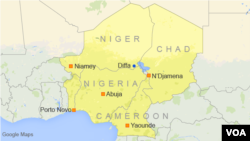A Nigerian court has condemned as "illegal and unconstitutional" the arrest and deportation of Cameroonian separatists who had applied for asylum in Nigeria, their lawyers said Sunday.
In January 2018, Nigeria arrested and sent back 47 anglophone separatists who had fled Cameroon following a crackdown by the authorities.
The move was denounced by UNHCR, the U.N. refugee agency, which said most of them had filed asylum claims. It accused Nigeria of breaching international agreements.
"Justice Chikere declared the arrest and detention of the 12 applicants illegal," said a statement from Nigerian law firm Falana & Falana, referring to a ruling issued last week in the capital Abuja.
"Consequently, Justice Chikere declared the deportation of the applicants illegal and unconstitutional, awarded (compensation) to each of them and ordered the federal government to ensure that they are brought back to Nigeria forthwith."
Among the 12 Cameroonian claimants in this case was separatist leader Julius Sisiku Ayuk Tabe, president of the self-declared "Republic of Ambazonia". He and his supporters were among those arrested by Nigerian intelligence agents on January 9, 2018.
Nigerian officials sent the group back to Cameroon a few weeks later on January 26.
For months, the 47 have been held in isolation at a high-security facility at police headquarters in Yaounde, Cameroon's capital.
In December, a military court in Yaounde opened a trial against Ayuk Tabe and nine others for "terrorism" and "secession".
Just before the start of that trial, Ayuk Tabe was transferred to a lower security prison in the capital where he can receive visits.
The next hearing is scheduled for March 7. Defense lawyers have already argued before the court that the defendants should be returned to Nigeria.
During last week's hearing in Abuja, defense lawyer Femi Fakana had argued that the arrest and detention of refugees and asylum seekers constituted a breach of Nigeria's constitution and the African Charter on Human and Peoples' Rights.
The judge agreed, saying the expulsion of the group was in "utter violation" of legal obligations which ban Nigeria "from expelling or deporting refugees" from the country.
He ordered the government to ensure they were brought back to Nigeria, and that their fundamental rights were respected.
Mark Bareta, one of the leading advocates of the anglophone separatist cause, welcomed the Nigerian court ruling.
English-speaking Cameroonians "are happy that at least in Nigeria there is an independent judiciary," he wrote on his Facebook page, which has more than 100,000 followers.
They were hoping that the Nigerian government would respect this legal ruling, he added.
Clashes between the armed forces and separatists take place almost daily in the two Anglophone regions on the western flank of Cameroon.
Resentment there at perceived marginalization by the French-speaking majority boiled over into an armed uprising in late 2016, prompting a harsh government crackdown.






